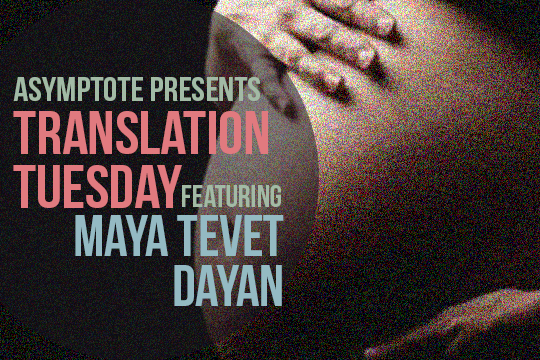Maya Tevet Dayan’s poem lays bare the loneliness of grief. Uniquely about the state of being un-mothered, it is universal in conveying intense emotional loss. The nuances of feeling and sentiment have been expertly translated from the Hebrew by Rachel Tzvia Back.
1.
It was evening, it was chaos, it was edge of the abyss.
And the quiet stood still.
A young doctor walked in and walked out
and was unable to say
if you had left or if
you were still here. Because at your end
you were no longer breath
just the hovering wing beat
of a fluttering heart.
Remember?
Exactly as I once was
in your belly. Heart and heart,
no breath.
My beginning was a fetus of life.
Your ending was a fetus of death.
2.
With your death you willed us your death.
Convoys of black words march nowhere
in your journals. Small emptied travel bags wait in the drawer
for nothing. My hands keep putting back in place
bottles and brushes that are no longer of any use.
Because now it’s time to sum up your journeys backwards
and your words – from the last
to the first.
And one must tell at length what happened
just like retellings of the Exodus tale:
Blood. Darkness. Death of the Firstborns.
3.
I pull off
The small tacks that attach you to
the bulletin board, sort you
into boxes according to subject
and bury them in closed drawers.
A bit from here
a bit more from there
and already there are entire rooms where you
are not.
But the true sorrow belongs to your shoes
that worship with all their emptied curves
your toes, your arches, your soles.
Like a devotee, consumed with longings
venerating his god’s feet.
4.
That night
was rainy like now.
Bursts of water pelted the roof like bullets
and my sister called to tell me you were dead.
I cried in the small arms of my daughter.
She said: I’ll be your mother now,
I told her
You be my daughter,
and I remained motherless.
5.
The pregnancy of your death is longer
than can be borne
and sometimes
the slender threads of my patience threatens
to break—
like the delicate white strings of light
stretched from the lotus stem:
if they don’t rip
cloth is woven from them
more merciful than silk.
Every year
as my orphaned birthday draws near,
Mother,
I expect you
to be reborn to me.
Translated from the Hebrew by Rachel Tzvia Back
Maya Tevet Dayan is an Israeli-Canadian poet and writer and a professor of Hinduism based in Vancouver. She was born and raised in Israel. Poems from her critically acclaimed poetry collection (It was Evening, It was Chaos, 2015) have appeared in English and in Hebrew, been translated into English and Russian, have won prizes in Israel, and have appeared in various publications, including Modern poetry in Translation and Literary Review of Canada. Her second collection of poetry is forthcoming in Israel by the end of 2017 in the prestigious Kvar poetry series.
Rachel Tzvia Back is a poet, translator, peace activist and professor of literature. Her work includes the poetry collections On Ruins & Return: Poems 1999-2005, Azimuth, The Buffalo Poems, and Litany. She is also the author of the critical work Led by Language: the Poetry and Poetics of Susan Howe. Her translations of the poetry of pre-eminent Hebrew poet Lea Goldberg in Lea Goldberg: Selected Poetry and Drama were awarded a 2005 PEN Translation Grant. Rachel Tzvia Back’s poetry and translations have appeared in numerous journals in America and abroad, including The American Poetry Review, Sulfur, Bridges, Tikkun and Modern Poetry in Translation, and in several anthologies including the SUNY Press Anthology Dreaming the Actual: Contemporary Fiction and Poetry by Israeli Women Writers and The Defiant Muse: Hebrew Feminist Poems From Antiquity to the Present. In 2005 Back was a recipient of a Hadassah-Brandeis Institute Research Award, and in 1996 the Israeli Absorption Minister’s Award for Immigrant Writers.
*****
Read More Translations:
- Translation Tuesday: Two Poems by Kimo Armitage
- Translation Tuesday: “Punctuation of Life” by Lidija Dimkovska
- Translation Tuesday: “The Woman in Tula” by Kang Unkyo

